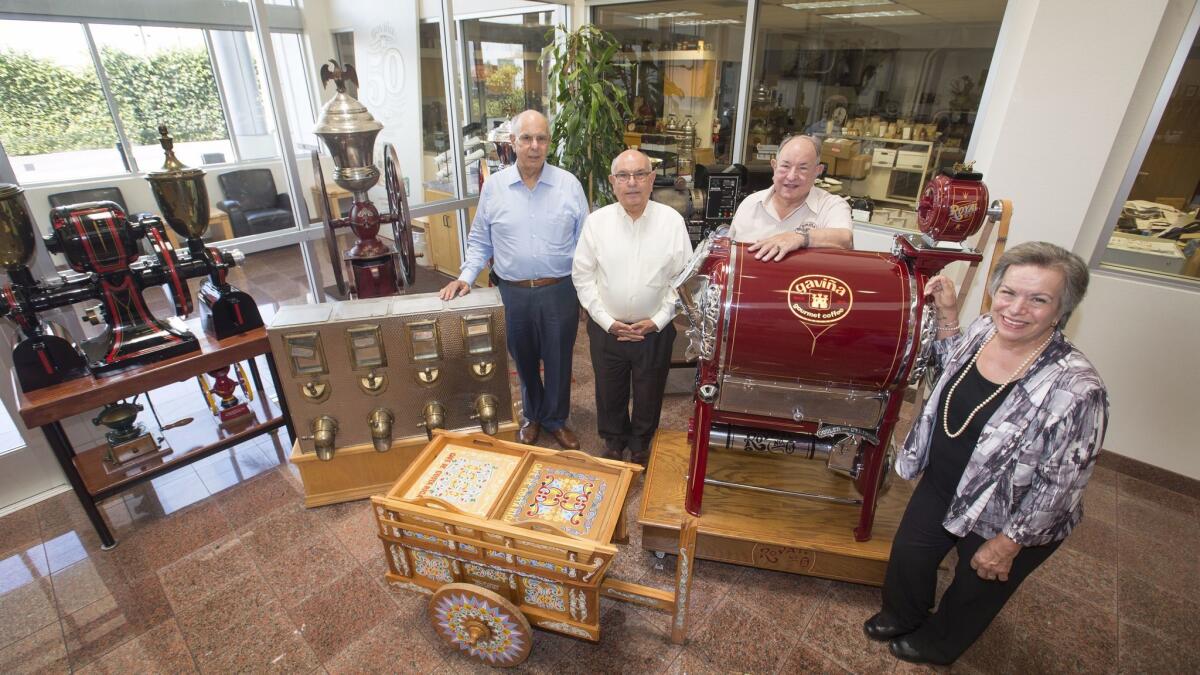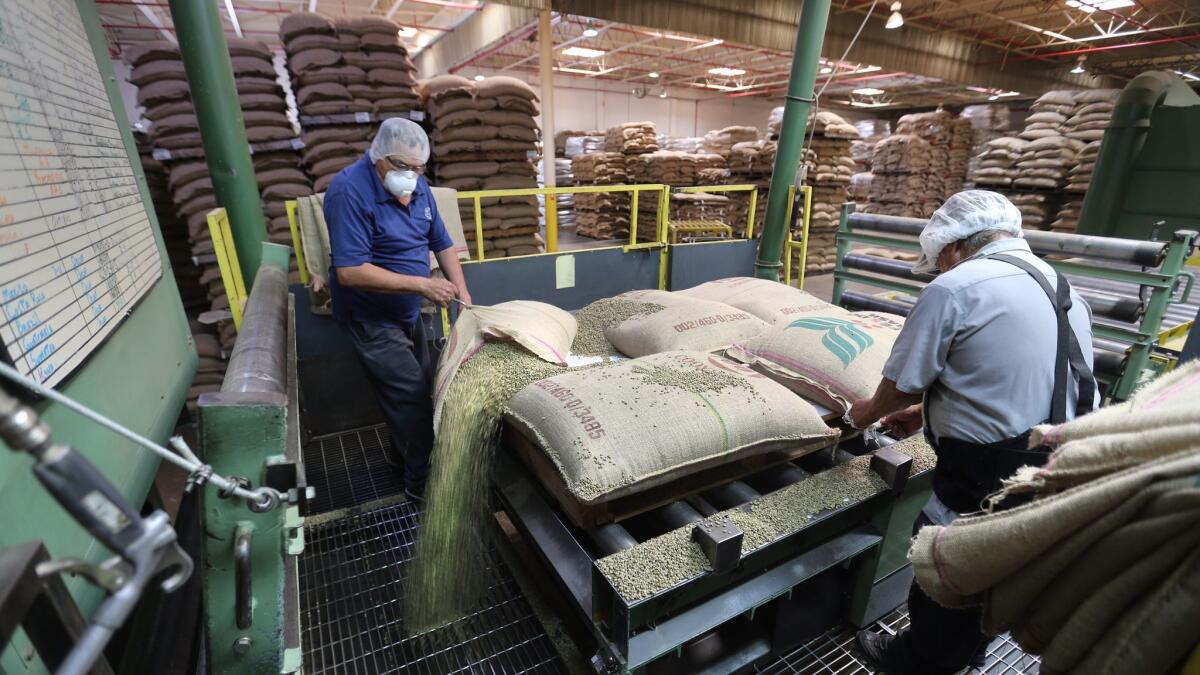This Cuban immigrant family has been keeping Los Angeles caffeinated for half a century

Gaviña coffee family celebrates 50 years of roasting coffee.
When you go to Don Francisco’s Casa Cubana, a sleek new coffeehouse in the Spring Arcade Building in downtown Los Angeles, you might want to order a cortadito — espresso with steamed milk — and walk to the rear, past the antique coffee gear on display, past the swank Victoria Arduino Black Eagle espresso machines. There, on the back wall, are striking photos of four generations of Gaviñas.
This is the Gaviña family’s first coffee shop, but not their first foray into coffee. This year marks their 50th year of roasting coffee in the Los Angeles area, not an insignificant milestone in a town that sees trends come and go faster than you can Instagram a charcoal latte. From their earliest days, the Gaviñas have served all of L.A.; indeed, their story is as L.A. as they come.
“Our grandfather in the late 1860s started growing coffee in Cuba,” says Pedro Gaviña, who, along with his siblings Jose, Paco and Leonor, run the company today. Their father, Francisco, was born on the farm and expanded the business into roasting; when Fidel Castro came to power, however, the family was forced to leave Cuba. They landed in Southern California in the early 1960s and, in 1967, with a small roaster they bought from Bob’s Big Boy, restarted their business in a 1,100-square-foot warehouse in Vernon.
Given that the morning cuppa then was likely to be made from low-grade instant coffee, peddling their freshly roasted beans was not easy.
Jose Gaviña estimates they made about $975 in sales during their first month in business. Their espresso first found a home in the Cuban community; other immigrants shared their love for fresh roast coffee — and espresso in particular — and their beans made their way into Armenian and Italian markets and restaurants.

In the 1970s, a couple who owned a small market were looking for coffee similar to what they drank in Vietnam. They took a liking to the Gaviñas’ French roast and were the first of many happy Vietnamese customers. Indeed, the Gaviñas’ coffee became such a part of the Vietnamese American experience that if you ordered coffee at a Vietnamese restaurant in the last 40 years or so, there’s a good chance their coffee is what you swirled into the condensed milk.
During the 1970s and 1980s, business took off as interest in higher quality coffee grew. This was the beginning of the specialty coffee industry — the term “specialty coffee” was coined in 1974 — and the Gaviñas joined a small group of roasters to co-found the Specialty Coffee Assn. of America (now the Specialty Coffee Assn.).
“The focus was on educating the industry and consumers about quality coffee,” says Leonor Valls-Gaviña. The SCA plays a similar role today, with its most public event, a nationwide barista competition, garnering, in some circles, the level of excitement usually reserved for the NBA playoffs.
In 1984, the Gaviñas entered the grocery aisle.
“In those days, you went to a supermarket, and it was just big walls of canned coffees. You had a red can, a blue can or a green can. And one all-purpose grind,” says Pedro Gaviña.
So they created Don Francisco’s Coffee, named after their father, and packaged their whole bean coffees in bags rather than cans, making them one of the first roasters to do so. They also were one of the first West Coast roasters to adopt one-way valves in their packaging, which prevent oxygen from entering the bag and staling the beans. That button-like valve is standard on coffee bags today.

From there, the Gaviñas built on their success, focusing, as Pedro Gaviña says, on quality, consistency and value. They added retail coffee lines and began supplying coffee for the likes of Costco and McDonald’s.
These days, the company operates out of a huge factory in Vernon, roasting 44 million pounds of coffee a year for everyone from pho shops to fast-food giants. Over 250 employees work there, many for decades; there’s even an on-site classroom where workers can take language classes and prepare for citizenship tests. The company is a constant presence at community events and supports a number of sustainability projects in coffee-producing countries. Which gives you a sense of the family’s ethos: Despite its scale, the company remains, at heart, very much a community- and family-oriented organization.
With Don Francisco’s Casa Cubana, the community reach will expand even further. Leonor Valls-Gaviña says she has wanted to have a family shop for a while, and with the fourth generation ready to take it on, the time was right.
Casa Cubana opened Aug. 4, and at about 2,100 square feet, it’s nearly twice the size of the Gaviña family’s first facility all these years ago. A black-and-white photo of the original warehouse hangs on the back wall, as do pictures of the siblings back then — the brothers in dapper skinny ties, Leonor in an outfit that channels Annie Hall.

Looking at the photos, you might consider how the Gavinas have presided over momentous changes in the coffee world in the last 50 years: the transition from pre-ground canned coffee to whole beans in a bag, the rise of the specialty coffeeshop. You might contemplate the changes to come in the next 50 years. You might want to order another cortadito.
Casa Cubana, 541 S. Spring St., Los Angeles, (213) 537-0323, www.dfcasacubana.com.
ALSO:
Your summer beer party guide, plus how to select the perfect keg
Got a glut of tomatoes? Make the Tuscan dish pappa al pomodoro
The guy who brought us Gjelina is now making ramen, gyoza (and natto hand rolls) on Abbot Kinney
More to Read
Eat your way across L.A.
Get our weekly Tasting Notes newsletter for reviews, news and more.
You may occasionally receive promotional content from the Los Angeles Times.










